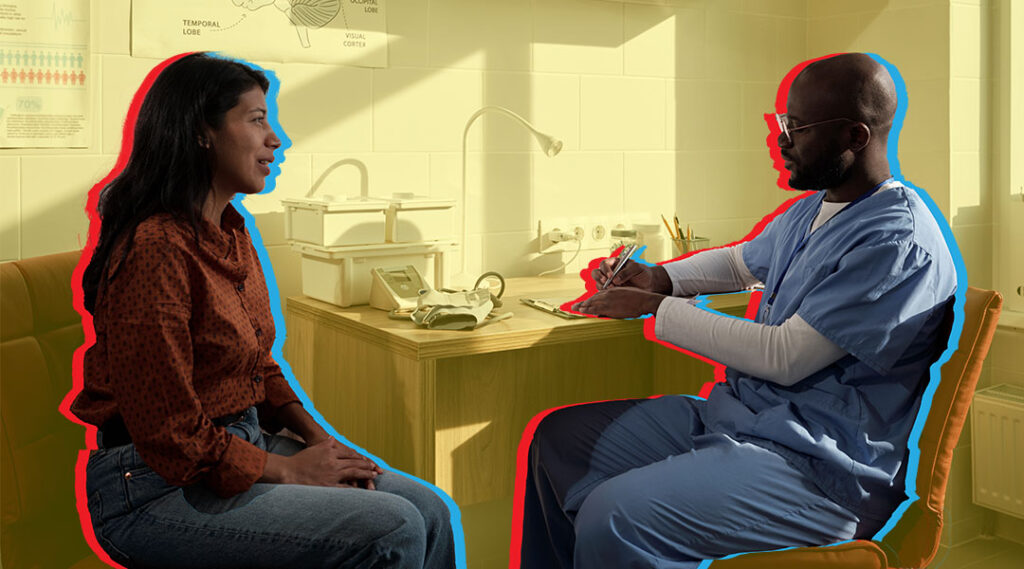Although they study for many years, not all health professionals are prepared to talk about sexual health. As incredible as it may seem, medical schools don’t spend much time addressing this aspect of human nature, except from a biological perspective.
This is why it can be difficult to try to open the conversation on this topic with your GP, or you may not know if they are the right specialist to help you. In this regard, here we present some tips to prepare you for that moment that can be uncomfortable not only for you, but also for the professional who is under the white coat.
Start at the beginning
The first step in talking about something so intimate can be the most difficult, so it would be wise to practice some comfortable phrases before you arrive at the office. You could start by saying “I’m having a problem with my sex life…” or “I’m having problems/concerns in the sexual area…” or “I wanted to talk to you about my sex life…”.
It is always a good idea to write down your ideas, concerns and doubts and take this writing to the consultation, and in any case, you could give the paper to your doctor at the beginning so that he knows what you hope he can help you with.
To continue the conversation, you could say something like, “I’m worried about _____ (for example, low sex drive, lack of arousal, pain during sex, difficulty reaching orgasm, erection problems, etc.). Could you help me?”
In this way, you will give the doctor the opportunity to investigate the problem further, if it is in his power to help you, or to decide whether to refer you to another specialist, for example, in sex therapy, urology or gynecology.
A step ahead
After that first step, and in case the doctor is not sure when answering your questions, you can help him a little by asking something like: “Can you help me with these sexual problems? If not, could you refer me to another specialist for that?”
On the other hand, if the professional begins to elaborate on the subject, but you feel that you need something more concise, you could ask: “Do I need to take tests?” or “What could be the cause of my problem?” or “What solutions do you recommend?” On this last point, the answer could be one of these options: improving communication with your partner, sex (or other) therapy, lifestyle changes, medication, educational strategies, or some other alternative.
It is also valid to ask if your partner should be involved in your treatment or therapy, and if the doctor has any information or resources (such as books, magazines or websites) that they can recommend to address your problem.
What you will have to answer
If the medical professional feels qualified to help you, they will begin an interrogation like the one they do when you come to them with other health problems. This helps you drawing a picture and a history of past situations that may have led you to what worries you today. It will also help you deciding what the best solution for your problem is.
Among the questions about your general state of health and your sexual life, some may arise such as: do you have any specific health problem? Do you have one or more sexual partners? Is your sex life satisfactory? If not, why do you think this dissatisfaction is due? Do you feel sexual desire? If you have a partner, do you think that the desire of both is compatible?
And if he or she is the one who initiates the conversation, the questionnaire can go in this direction: are you having problems in your sexual life (lack of desire, vaginal dryness, lack of orgasm, premature ejaculation, erectile dysfunction, etc.)?; how much do these problems bother you?; do you have orgasms?; Do you have pain during penetration (either anal or vaginal, using the penis or fingers)?
As you can see, the conversation can be as specific as you need it to be, and you can go ahead as long as you feel comfortable talking about it with the doctor. If you are not finally satisfied with his answer, if you feel that it does not help you or if it makes you feel uncomfortable for any reason, you do not need to keep talking or insist on seeking help from this specialist. Well you can look for another space or another professional to find a solution.
At AHF Latin America and the Caribbean we know the importance of building spaces of respect and confidentiality to talk about sexual life, especially about infections such as HIV. If you want to get a free screening test or need free condoms, come to one of our offices, we are in 11 countries in the region.







